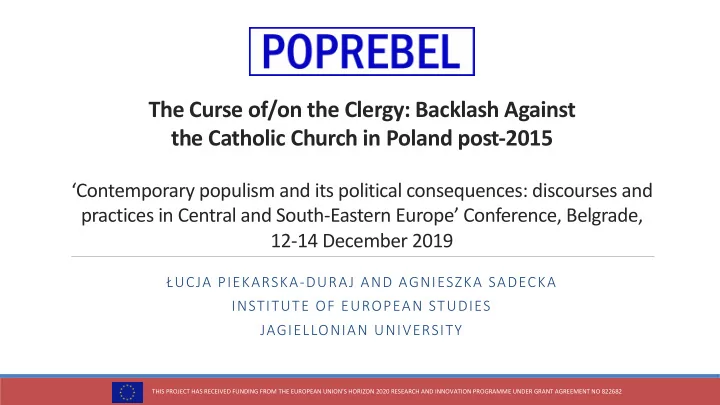

The Curse of/on the Clergy: Backlash Against the Catholic Church in Poland post-2015 ‘Contemporary populism and its political consequences: discourses and practices in Central and South-Eastern Europe’ Conference, Belgrade, 12-14 December 2019 ŁUCJA PIEKARSKA-DURAJ AND AGNIESZKA SADECKA INSTITUTE OF EUROPEAN STUDIES JAGIELLONIAN UNIVERSITY THIS PROJECT HAS RECEIVED FUNDING FROM THE EUROPEAN UNION’S HORIZON 2020 RESEARCH AND INNOVATION PROGRAMME UNDER GRANT AGREEMENT NO 822682
CATHOLIC CHURCH AND POPULIST POWER IN POLAND v The Catholic Church as central to the establishing, structuring and legitimising of populist discourse in Poland v The Church as guardian of (neo-)traditionalist values: v The only and universal truth (as opposed to post-modern relativity) v Tradition and ontological security (as opposed to fluidity) v Patriarchal order (as opposed to constructed identities) v Homogenous community (as opposed to diverse society) v Glorification of sacrifice and victimhood v Unbreakable bond between the notion of Polishness and Catholicism (as opposed to secularism and cosmopolitanism) v The Church’s main mission is to translate values into norms and to remain the most relevant frame of reference for the moral and social order v The Church as ideal legitimising institution for populists in government, because it is perceived as timeless, apolitical, trustworthy and placed above the political sphere (while in fact it is a political actor)
“ONLY UNDER THE CROSS, UNDER THIS SIGN ONLY, A POLE WILL BE A POLE AND POLAND WILL BE POLAND” Symbolic images of Catholic Church in Poland Catholic Church as a guardian-shephard Catholic Church as a protector of Polishness Catholic Church as the power aspiring to monopolise the normative order Catholic Church as a political player How are these images transmitted and contested by culture? Theatre play “The Curse” (2017) directed by Oliver Frlji ć Movie “Clergy” (2018) directed by Wojtek Smarzowski Documentary “Tylko nie mów nikomu” [“Tell No One”] (2019) directed by Tomasz Sekielski Theatre play “Hamlet” (2019) directed by Bartosz Szyd ł owski How are these works inscribed in the political context? What is the debate on Catholic Church in times of populism ?
”THE CURSE” Oliver Frlji ć : “Testing of what is allowed in art is my duty” The play questions the monopoly of the Church to set boundaries and tests the limits of artistic expression -> challenging the role of art and of the artist -> challenging of the sacred
“HAMLET” The play shows the clergy as a collective political actor (Polonius as Archbishop J ę draszewski). The world is a stage, the stage is the world. “Hamlet is ending, this is reality. The dream is over”
“CLERGY” “The Church is holy, but the people in the Church are sinners.” Allegory of the sins of the Church and abuses of power. Clergy as a monolithic class vs individual agency of priests
“TELL NO ONE” Universal truth of the Church and mythical image of the clergy (symbolic reality) vs individual and experienced realities of abuse Who has the right to be a victim?
Gazeta Polska “Clergy is our treasure in the fight with Nazism, communism, LGBT and Islamists” Jaros ł aw Kaczy ń ski: “who raises their hand on the Church, who wants to destroy it, raises their hand on Poland”
Mariusz Max Kolonko, Youtuber: “an offensive of “cultural Marxism”” Jan Dziedziczak, PiS: “you think that the Jewish star needs to be protected, while the cross can be spit upon” Pawe ł Lisicki, Do Rzeczy: “I would like to see how these outstanding artists offend other feelings, because so far, their breaking of taboo is only targeted at Catholics” Maciej Ś wirski, Reduta Dobrego Imienia: “such art contributes to the deconstruction and destruction of the basics of European civilisation”
CONCLUSIONS Cultural expression challenges the symbolic images of the Catholic Church. Challenging Catholic Church means that the foundations of populist discourse (absolute truth, set norms, unchangeable values, homogenous community, collectivist trust in traditional institutions and leaders etc.) are questioned. Anxiety of the populists in power and creation of counter-discourses (Church and nation as victims, new ideological enemies: e.g. LGBT minorities, generalised elites, various Others).
Recommend
More recommend